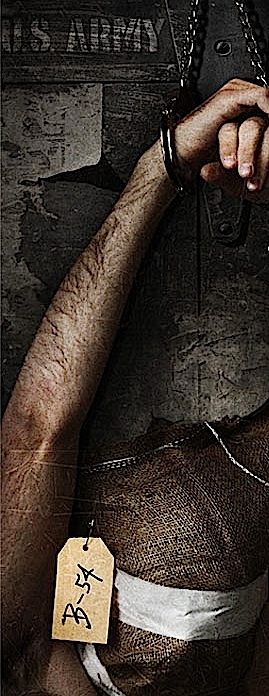 HARPERS: Army Private Brandon Neely served as a prison guard at Guantánamo in the first years the facility was in operation. With the Bush Administration, and thus the threat of retaliation against him, now gone, Neely decided to step forward and tell his story. “The stuff I did and the stuff I saw was just wrong,” he told the Associated Press. Neely describes the arrival of detainees in full sensory-deprivation garb, he details their sexual abuse by medical personnel, torture by other medical personnel, brutal beatings out of frustration, fear, and retribution, the first hunger strike and its causes, torturous shackling, positional torture, interference with religious practices and beliefs, verbal abuse, restriction of recreation, the behavior of mentally ill detainees, an isolation regime that was put in place for child-detainees, and his conversations with prisoners David Hicks and Rhuhel Ahmed. It makes for fascinating reading. Neely’s comprehensive account runs to roughly 15,000 words. It was compiled by law students at the University of California at Davis and can be accessed here. Three things struck me in reading through the account. […]
HARPERS: Army Private Brandon Neely served as a prison guard at Guantánamo in the first years the facility was in operation. With the Bush Administration, and thus the threat of retaliation against him, now gone, Neely decided to step forward and tell his story. “The stuff I did and the stuff I saw was just wrong,” he told the Associated Press. Neely describes the arrival of detainees in full sensory-deprivation garb, he details their sexual abuse by medical personnel, torture by other medical personnel, brutal beatings out of frustration, fear, and retribution, the first hunger strike and its causes, torturous shackling, positional torture, interference with religious practices and beliefs, verbal abuse, restriction of recreation, the behavior of mentally ill detainees, an isolation regime that was put in place for child-detainees, and his conversations with prisoners David Hicks and Rhuhel Ahmed. It makes for fascinating reading. Neely’s comprehensive account runs to roughly 15,000 words. It was compiled by law students at the University of California at Davis and can be accessed here. Three things struck me in reading through the account. […]
The Nelly account shows that health professionals are right in the thick of the torture and abuse of the prisoners—suggesting a systematic collapse of professional ethics driven by the Pentagon itself. He describes body searches undertaken for no legitimate security purpose, simply to sexually invade and humiliate the prisoners. This was a standardized Bush Administration tactic – the importance of which became apparent to me when I participated in some Capitol Hill negotiations with White House representatives relating to legislation creating criminal law accountability for contractors. The Bush White House vehemently objected to provisions of the law dealing with rape by instrumentality. When House negotiators pressed to know why, they were met first with silence and then an embarrassed acknowledgement that a key part of the Bush program included invasion of the bodies of prisoners in a way that might be deemed rape by instrumentality under existing federal and state criminal statutes. While these techniques have long been known, the role of health care professionals in implementing them is shocking. MORE
WASHINGTON POST: Barre is one of approximately 245 detainees at the  military prison in Cuba whose fate the Obama administration must decide in coming months. Teams of government lawyers are sorting through complex, and often flawed, case histories as they work toward President Obama’s commitment to close the facility within a year. Much of the government’s evidence remains classified, but documents in Barre’s case, and a handful of others, underscore the daunting legal, diplomatic, security and political challenges.
military prison in Cuba whose fate the Obama administration must decide in coming months. Teams of government lawyers are sorting through complex, and often flawed, case histories as they work toward President Obama’s commitment to close the facility within a year. Much of the government’s evidence remains classified, but documents in Barre’s case, and a handful of others, underscore the daunting legal, diplomatic, security and political challenges.
As officials try to decide who can be released and who can be charged, they face a series of murky questions: what to do when the evidence is contradictory or tainted by allegations of torture; whether to press charges in military or federal court; what to do if prisoners are deemed dangerous but there is little or no evidence against them that would stand up in court; and where to send prisoners who might be killed or tortured if they are returned home. Answering those questions, said current and former officials, is a massive undertaking that has been hampered by a lack of cooperation among agencies and by records that are physically scattered and lacking key details. MORE
 TANGENTIALLY RELATED: A drug which appears to erase painful memories has been developed by scientists. The astonishing treatment could help sufferers of post-traumatic stress disorder and those whose lives are plagued by hurtful recurrent memories. But British experts said the breakthrough raises disturbing ethical questions about what makes us human. They also warned it could have damaging psychological consequences, preventing those who take it from learning from their mistakes. Dutch researchers claim to have erased bad memories by using ‘beta-blocker’ drugs, which are usually prescribed to patients with heart disease. The drug could erase frightening memories — such as spider phobia. Experiments on animals had already shown that the drugs — beta-adrenergic receptor blockers — can interfere with how the brain makes and remakes memories of frightening events. MORE
TANGENTIALLY RELATED: A drug which appears to erase painful memories has been developed by scientists. The astonishing treatment could help sufferers of post-traumatic stress disorder and those whose lives are plagued by hurtful recurrent memories. But British experts said the breakthrough raises disturbing ethical questions about what makes us human. They also warned it could have damaging psychological consequences, preventing those who take it from learning from their mistakes. Dutch researchers claim to have erased bad memories by using ‘beta-blocker’ drugs, which are usually prescribed to patients with heart disease. The drug could erase frightening memories — such as spider phobia. Experiments on animals had already shown that the drugs — beta-adrenergic receptor blockers — can interfere with how the brain makes and remakes memories of frightening events. MORE
